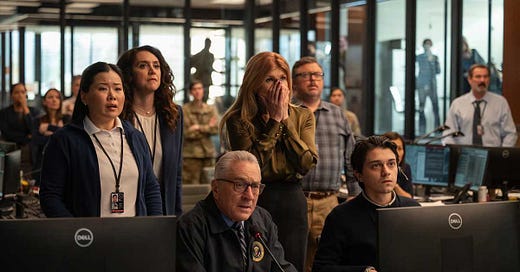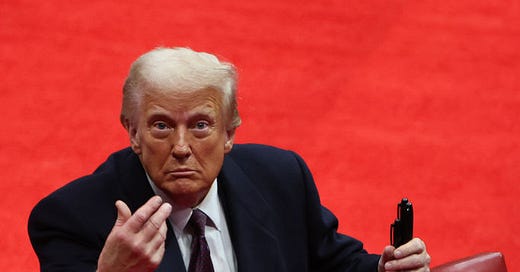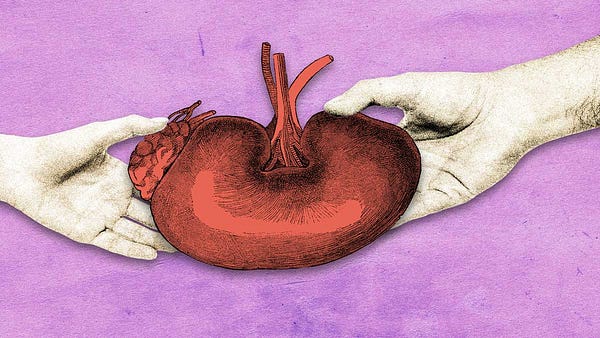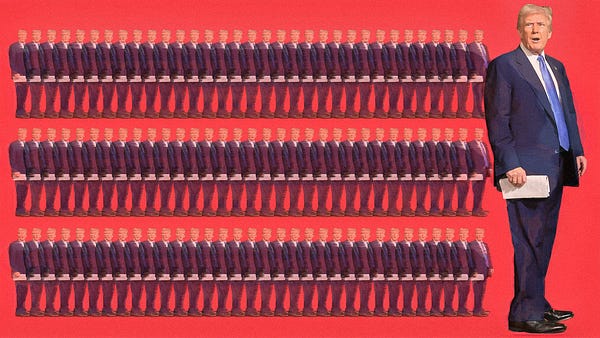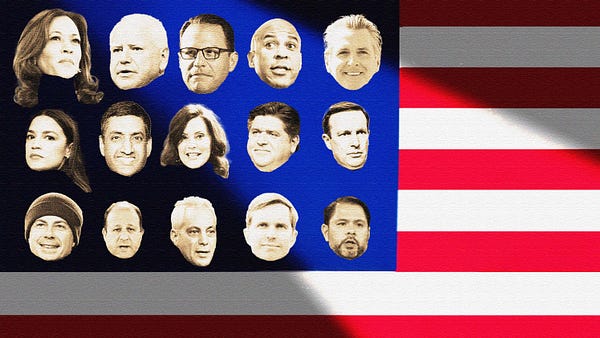
The Free Press

The year was 2012, and I was 16, watching Mitt Romney debate Barack Obama on TV with my stepdad, a log truck driver who’d raised me since the age of five—and whose verdict was this: “It don’t matter anyhow.” He said it, spitting his Copenhagen longcut into a Dr. Pepper can. “They already decided who’s gonna win anyway.”
He didn’t say who they were, but he didn’t need to. I’d heard the specter of they invoked my whole life by friends and family in our small East Texas town. They were planning to take away our guns. They shipped our jobs overseas. They wanted everyone to stop using cash to track our every movement. And of course, they killed Kennedy.
Americans are conspiratorial. Sixty-five percent of us believe that Lee Harvey Oswald did not act alone—and belief in the “official narrative” reaches majority consensus only among people with postgraduate degrees. Almost nobody believes Jeffrey Epstein killed himself. Also, Americans are suspicious of our leaders—only 22 percent of us trust the government to do what is right most or all of the time, and that figure hasn’t been at 50 percent since 1972—but we also don’t believe they have that much control. Fully 41 percent of Americans believe that “regardless of who is officially in charge of the government and other organizations, there is a single group of people who secretly control events and rule the world together.”
We also really, really love telling elaborate stories about high-level conspiracies. The latest one is Zero Day, Netflix’s new political “thriller.” The hero, Joe Biden—sorry, I mean “George Mullen”—is an elderly, one-term, moderate, dead-son-having, possibly dementia-addled former president played by Robert De Niro. After America experiences a mysterious cyber attack that leads to the deaths of more than 3,000 people, he is asked to lead a commission investigating its causes. He is given enormous powers, including the suspension of habeas corpus.
In his pursuit of the truth—which is presented as noble—Mullen relentlessly abuses his power. For instance, he abducts a character obviously based on Tucker Carlson in the middle of the night, without a warrant, throwing a hood over his head and then torturing him for information. He also convinces the current president—played by Angela Bassett—to shut down the entire banking system, and threatens to place a veteran’s child into foster care, among other things. Again, Mullen is the hero here, and all of these acts are portrayed as necessary evils undertaken for the greater good.
After following a series of false leads, Mullen uncovers the truth. It wasn’t the CIA, who are portrayed as heroes for saving Mullen from an angry mob. Instead, they were people with faces and names: a bipartisan group of legislators and oligarchs, sick of political gridlock, who decided to undercut the extremists on both the left and right. And so they worked with a ring of sketchy billionaires to manufacture a crisis that would bring the country together. (Although they didn’t expect anyone to die in the process.)
The takeaway for the viewer is there is no systemic problem, no insidious deep state, no immovable force of power shaping the country against its will. In Zero Day, the masses are bad, overly polarized, and too shortsighted to see how necessary it is for Mullen to wipe his ass with the Constitution in pursuit of finding truth and restoring normalcy. All America really needs is a principled moderate to tell hard truths and give a good speech—which Mullen does, in true West Wing fashion, at several points throughout the series.
Basically, this show might be the most obvious example of regime propaganda I’ve ever come across. I was shocked at how swampy its politics were—until I realized it was co-created by a former head of NBC and a former national security reporter for The New York Times. This perhaps accounts for its establishment politics and its overly libidinal Tucker Carlson torture scenes. Ratings jealousy manifests in all sorts of ways. Who knows, maybe next season they’ll have De Niro waterboarding a stand-in for Elon Musk.
In its failure, Zero Day also highlights why Oliver Stone’s 1991 film JFK is a classic in the conspiracy genre, which my colleague Eli Lake underscores in the latest episode of his Breaking History podcast. Stone’s film works because most Americans already believe that elections are nothing more than a glorified suggestion box—and that ultimately, nameless, faceless men with more money and power than they have will do what they want with the country regardless of what anyone has to say about it—including the president.
In JFK, it wasn’t just the CIA who killed Kennedy, or just the FBI, or just the military-industrial complex. Kennedy’s brain was blown onto Jackie’s pink Chanel suit because he came up against all of the immovable institutional forces of postwar American imperial power who really control the country, otherwise known as them.
Zero Day fails because there is no “them.” The viewer isn’t given something they feel is true. Instead they are given an example of what happens when the liberal elite tries to imagine a conspiracy theory: an establishment revenge fantasy that lets the system off the hook, and reveals how out of touch the elites truly are.
The story of the JFK conspiracy theory isn’t just about a few hucksters red-pilling traumatized Boomers. No. It’s also about how the government squandered its most precious asset: the trust of the American people. Last week on Breaking History, Eli Lake examined the chain of events that led Donald Trump to declassify the remaining files on JFK’s assassination.

